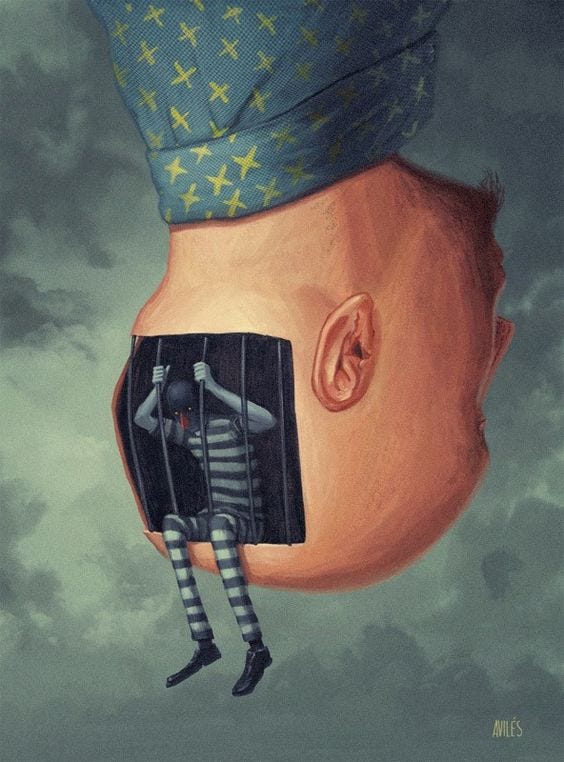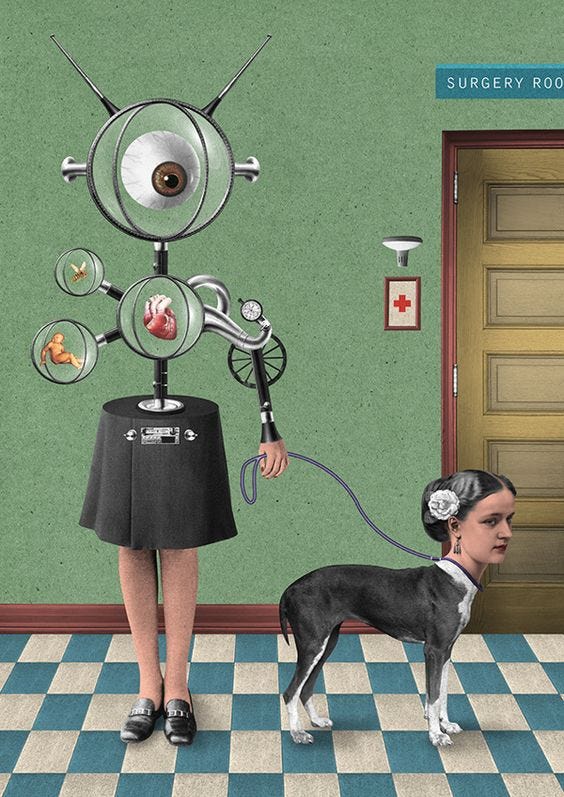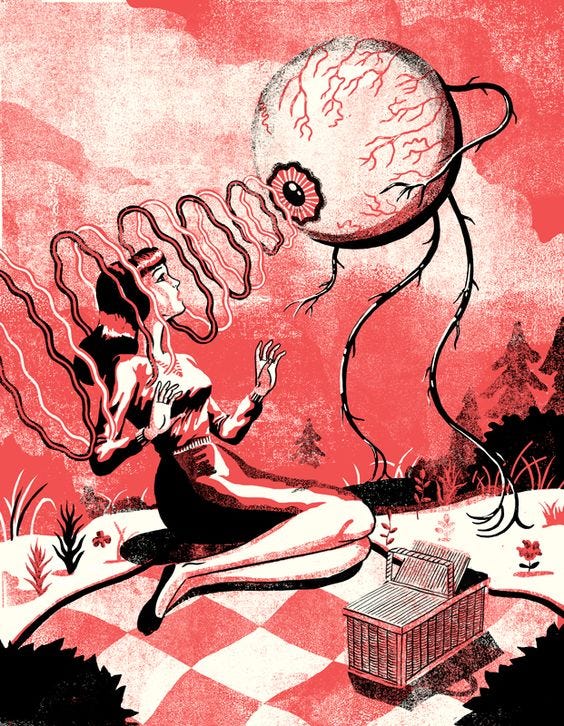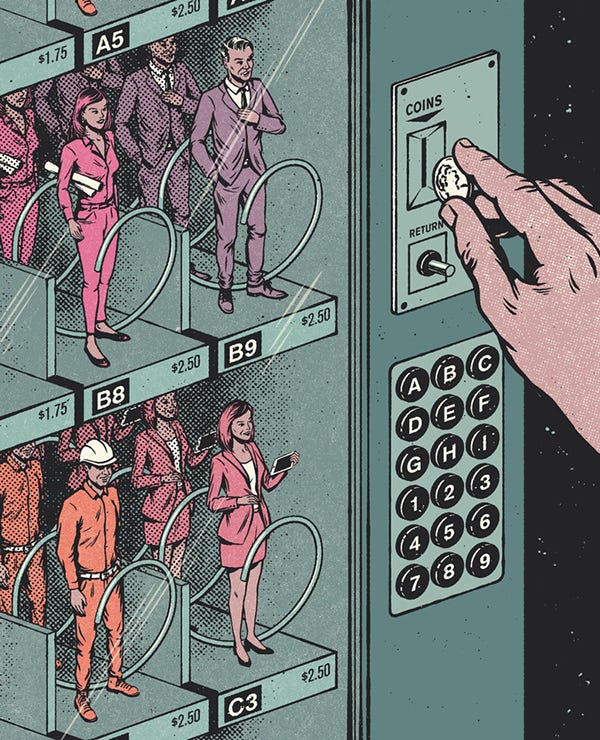Its presence is little noted, but its absence causes great distress.
I talk about agency quite often, because it’s something I only recently discovered (and eventually embraced) for myself.
Cultivating agency was a gruelling experience for me; it required a lot of learning, unlearning, risk-taking, and trusting myself to navigate unfamiliar paths. But that shouldn’t deter anyone from trying to develop their own sense of agency. Think of it as a personal project—it becomes a lot easier to get started once you accept that most long-term beneficial things in life are really difficult to obtain.
This topic has been on my mind a lot lately, so I want to reflect on what it means to go from little agency to high agency, why it took me so long to finally land here, and how to inspire a sense of agency.
what is this so-called “agency” anyway?
Agency can be formally defined as the subjective feeling of having control over one’s actions and their consequences. (Let’s ignore the free will debate for now, please!)
Put differently, you don’t feel as though life is just happening to you, with your only choice being to sit back and accept it all. Instead, you feel as though you are an active participant in your life; you are making things happen.
You might feel high agency when you allow your mind to wander and embrace your curiosity, a behavior that is intrinsic to being human no matter how difficult it feels at times. You might feel high agency when you take a leap of faith and share your creative work with others (music, photography, writing, poetry), abandoning your fear of being judged. You might feel it when you own up to your mistakes and give a genuine apology, whether to yourself or someone else. Little things might inspire a sense of agency, too: watching the sunset after a difficult hike, hitting a new PR at the gym, doing something anxiety-inducing that will pay off in the long run.
But high agency can be hard to describe, or even understand, if you don’t have it. I grew up in a conservative household with little to no autonomy, and if you had asked me then to define agency, I would have struggled to give you a clear answer. How can you articulate something you’ve never experienced?
For most of my life, I did not have a sense of agency—both for reasons within and outside of my control—and I rarely came across others who could serve as my role models for living life with high agency. Not straying from the path laid out to me by others was the safest “decision” I could make, so I was never in a position to contemplate what having agency might look like for me. (In my first Substack post, I wrote a little bit about the difficulties of changing your worldview if you lack agency or are simply preoccupied with survival—this is relevant because cultivating a sense of agency requires a radical transformation of your worldview, which can be nearly impossible if you are not psychologically ready for it.)
A few months ago, I came across this post differentiating ambition from agency, and it helped me better understand what this so-called agency really is:
Growing up, I've always been mesmerized by people I perceived to be “moths” — humans fluttering around just outside of the bright glow of the traditional spotlight. While “butterflies” sparkled within traditional systems, moths seemed to be playing games entirely of their own making.
From the outside, agency is often misinterpreted as ambition, but I learned through observing these two types of people that they are actually quite different. Ambition means you're motivated to play games that others have already created in the world, while agency means you're driven to play a game of your own.
Something finally clicked for me. For a while, I thought gaining some aspects of independence would automatically grant me agency, but upon reflection, I don’t think the former necessarily guarantees the latter. Independence might be a helpful prerequisite for high agency, but agency is so much deeper than that. Every day, people live with more independence than I could ever dream of, but still don’t feel or exercise agency in their life. You might have independence, and you might be an ambitious person—but if you can’t even begin to fathom creating and playing by your own rules, do you really have agency?
Getting my license, having my own job, living in my own apartment, moving thousands of miles away from home—all of these allowed me to experience some amount of independence and required some ambition, but I was still playing someone else’s game. Sure, I was making decisions, but ultimately I was still trying so hard to please both people I knew and didn’t know. My decisions were all informed by a simple question that will break your spirit with time: what will others think? I was playing a game I didn’t want to play, too scared to find out what would happen if I didn’t adhere to the rules of this game. I didn’t even know I had the option not to play!
Frankly, despite my independence, I did not have agency.
Another post I encountered recently (I have screenshots of the post, but it has unfortunately been deleted) brushes on the concept of agency without explicitly naming it:
A commonality I’ve noticed about the really original characters, the people who go to do great things with their lives, is that they can see that most rules people think exist don’t.
…I don’t think people truly grasp how much of their lives are really a blank canvas. Most of the rules you think are there are simply blinders we willingly put on because of societal expectations.
I sometimes feel like I’m in a society of mimes behind fake walls who’ve started to believe their act and they look on in shock as I carelessly walk through all of their boundaries with no resistance.
— Kat Woods
In her post, Woods is clearly talking about navigating her life with high agency. She’s not playing according to other people’s games or the rules of some traditional system that isn’t working anymore—she’s creating her own rules as she goes about her life. This is the key to having high agency. (For the record, I’m not talking about breaking laws. It can be as simple as refusing to enter a career path you hate despite pressure from your family and community, for example.)
Woods goes on to ask if this “originality” can be taught, and notes that she has only ever met people who always seemed to know this or spontaneously discovered it. “I think for me I learned it when I took a gap year between high school and university and learned I could learn on my own, which opened the floodgates,” she continues. “Maybe for some it could just be enough to read this. Perhaps purposefully trying to find and read about alternate lifestyles could be helpful. For others maybe being around people who think this way could help internalize it.”

I think she’s right—but I would add that, in order to develop agency, one needs to be psychologically ready to embrace it (i.e., change their worldview) once they spontaneously discover it. For instance, abandoning a victim mentality and being open to taking risks.
how did i get here?
When I think of how I developed high agency (or at least, high agency relative to what I had), I recall a number of decisions, events, and thoughts that led me here:
Recognizing all the ways I tried to exercise my agency when I thought I didn’t have any
One day, after learning about the concept of a sense of agency, I realized that I had been fighting for it in small ways my entire life. When I was a teenager and at the peak of not having any autonomy, I would occasionally fight back and question why I wasn’t allowed to do something. I would sometimes sneak around to do what I needed to do, if I felt like the restriction was unreasonable or had no basis in ethics. I fought to have my own part-time job as a way to gain some financial independence. My community shamed any woman who left home for college or work before getting married—but I pushed back and did it anyway. In college, when I had gained some autonomy over my life, I dropped the career path that was chosen for me and pursued my own passion, despite disappointing many as a result. Turns out, I was desperately trying to claim my sense of agency—it was terrifying, it was difficult, and at times I considered how much easier it would be to just accept what was expected of me and avoid all the… drama.
This realization—that I had been fighting for my sense of agency even when I had very little of it—was so necessary for me to push through and understand that I owe it to myself to keep going. I think anyone can develop a sense of agency, no matter how broken their spirit might be. You just need to find all the ways that you’ve been fighting for it all along—it’s only human, afterall. Some of us might just have to dig a little bit deeper, but it is there.
Ask yourself: Is there something you’re doing that you feel is unnecessary, or can be done in a better way? What aspects of your life make you feel uneasy, as though something is just… not right? What do you do that makes you unhappy, and can it be fixed? Who are you trying to please at your own expense?Surrounding myself with people who have a high but realistic sense of agency
I found myself attracted to people who exhibited high-agency traits like being decisive, knowing what they want in life, and having big dreams and taking non-conventional or otherwise risky steps to achieve those dreams. (I learned later that many of these people were raised to feel a sense of agency, which is likely why it came so naturally to them; now, I often think about all the ways I’ll raise my future children to have their own sense of agency.)
I liked those people, so I kept them around—despite the fact that we were nearly opposites. I had big dreams but it took a lot to convince myself to act on them; I was extremely risk-averse and preferred the safest paths to avoid conflict, uncertainty, or discomfort; I was highly motivated but, again, playing someone else’s games.
There were moments when these high-agency people angered me. What makes them think they can just… do that? I would think, not realizing that most of that anger was probably directed at my self-imposed constraints.
I wholeheartedly believe that you are who you surround yourself with. I have always taken my inner and even outer circles very seriously, and I think more people should do that too. Are the people you see most often inspiring you, or bringing you down? Do you admire and respect them? Do they bring out the best or worst in you? I know it can be difficult to find friends, especially these days, but it shouldn’t stop us from examining our circles to make sure they’re not holding us back or keeping us down.Understanding that I was going to essentially ruin my life if I didn’t act with a sense of agency
At some point later in college, I felt urgency around the need to develop a sense of agency. I saw first-hand how beneficial it was for the (few) people in my life who had it—they were confident in their decisions, they didn’t let the fear failure deter them from acting, and they were experiencing noteworthy milestones in their life whether or not they had been successful in their original ventures. Even when they failed, they persisted. I admired them, and I knew that I needed to make a change in my life.
At the same time, I was realizing how many personal and interpersonal issues ultimately traced back to feeling like one has little to no agency. Everything from confidence to motivation can be traced back to agency, at least to some extent. I was witnessing others’ lack of agency lead to real life consequences that I wanted to avoid. This realization leads me to my last and perhaps most important piece of advice about developing a sense of agency:Eliminating unproductive feelings of victimhood and distancing myself from people who have a victim complex
I was consistently encountering people whose worldview relied on feeling like a victim, to the point where they developed a complex about it. A victim mentality is, in my opinion, one of the biggest threats to cultivating a sense of agency. Perpetual victimhood cannot coexist with agency.
To be clear, I’m not talking about horrific events and circumstances that produce victims (or survivors, as some people prefer to say). Thinking of someone—or yourself—as a victim in certain cases can actually be a useful framework for finding solutions. I’m talking about people who unproductively cope with adverse life events by refusing to take accountability and instead blaming anyone and anything else for their woes; it’s a comfortable position to be in because someone with a victim complex can avoid responsibility, garner sympathy, and always find a way to justify their harmful behaviors. The crux of the mentality is the absence of agency.
Reminder that a sense of agency means feeling like you have control over your actions and their consequences. I think people tend to forget that second part; owning your mistakes and their consequences is extremely difficult, which might be a motivating factor for some people to adopt victim complexes. (A victim complex is learned!)
I highly recommend reading the articles linked here and here, but to summarize, some signs of someone with a victim mentality include:Believing things always happen to you that are not your fault
Always placing blame on someone or something else
Taking things personally even when they were not meant that way
Not wanting to make any changes or consider solutions
Self-sabotage, negative self-talk, low confidence/self-esteem
Seeing how harmful these behaviors are motivated me to challenge any feelings of victimhood I held for myself, which is a necessary step to developing a sense of agency.
so, what now?
Finding and developing your sense of agency is a lifelong project, especially if you were not raised with this mentality. Developing a beneficial habit or mentality is not enough—you must also find a way to maintain it.
So while I have higher levels of agency now than I did growing up, I am constantly faced the temptation to retract to my old ways because… well, it feels safer. But if I want to live a fulfilling and meaningful life, I can’t allow myself to do that. I’ll be working on maintaining my sense of agency despite life’s hurdles. I’ll continue challenging and updating my worldviews when necessary; acknowledging my fears but not letting them stop me unnecessarily; making note of things I want and don’t want for my life based on my observations of others.
One thing I’m working on now is understanding the limits of agency. I can’t always be in control—life simply does not work like that. There will be times when I have to deal with the consequences of decisions that were not mine to make—how should I react in these moments? There might be times when my sense of agency is exaggerated or unrealistic—how can I keep that in check and not get carried away? I’m still figuring things out, but what has worked for me the past few years is practicing gratitude every single day, recognizing that tragedies are part of being human and are not necessarily unique to me, and genuinely believing that I owe it to myself to develop my sense of agency. I always had it in me.
I often think about the sentence at the beginning of my post: Its presence is little noted, but its absence causes great distress. Those lucky enough to have been raised with a sense of agency might not realize the gift they have until something threatens it one day—which, again, is inevitable because we can’t have complete control over our lives. But part of me believes that even those without a sense of agency are experiencing distress, whether they realize it or not—our bodies are, at all times, fighting to be alive both in the physical sense and in the philosophical sense.
So why not give it a chance and feel what it means to be truly alive?
don’t ask me why or how, but here’s some art that reminds me of living with and without agency









I really enjoyed this - I went through a really hard personal time a few years ago and developing a deeper sense of agency is something that has helped me indefinitely as more hard times have come up. But I think the last part was most poignant for me. I reckon that "challenging and updating my worldviews when necessary; acknowledging my fears but not letting them stop me unnecessarily; making note of things I want and don’t want for my life based on my observations of others" is vital. Agency isn't a destination that you eventually arrive at, it's a journey that you (can choose to) never stop travelling on. It never gets easier, you just go faster!